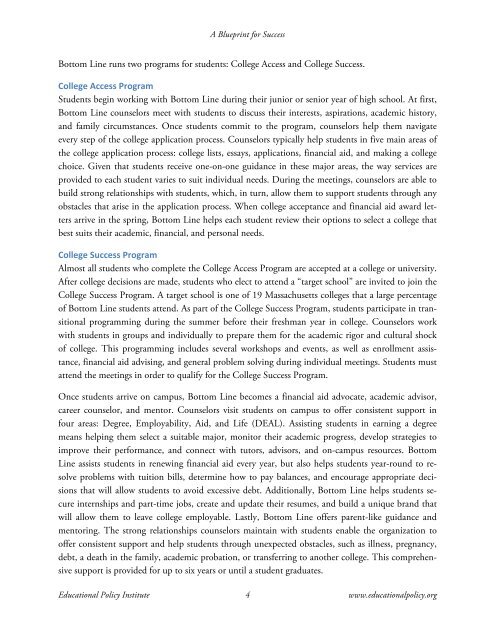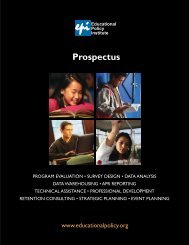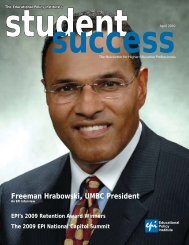A BluePrint for Success: Case Studies of Successful - Educational ...
A BluePrint for Success: Case Studies of Successful - Educational ...
A BluePrint for Success: Case Studies of Successful - Educational ...
Create successful ePaper yourself
Turn your PDF publications into a flip-book with our unique Google optimized e-Paper software.
A Blueprint <strong>for</strong> <strong>Success</strong><br />
Bottom Line runs two programs <strong>for</strong> students: College Access and College <strong>Success</strong>.<br />
College Access Program<br />
Students begin working with Bottom Line during their junior or senior year <strong>of</strong> high school. At first,<br />
Bottom Line counselors meet with students to discuss their interests, aspirations, academic history,<br />
and family circumstances. Once students commit to the program, counselors help them navigate<br />
every step <strong>of</strong> the college application process. Counselors typically help students in five main areas <strong>of</strong><br />
the college application process: college lists, essays, applications, financial aid, and making a college<br />
choice. Given that students receive one-on-one guidance in these major areas, the way services are<br />
provided to each student varies to suit individual needs. During the meetings, counselors are able to<br />
build strong relationships with students, which, in turn, allow them to support students through any<br />
obstacles that arise in the application process. When college acceptance and financial aid award letters<br />
arrive in the spring, Bottom Line helps each student review their options to select a college that<br />
best suits their academic, financial, and personal needs.<br />
College <strong>Success</strong> Program<br />
Almost all students who complete the College Access Program are accepted at a college or university.<br />
After college decisions are made, students who elect to attend a “target school” are invited to join the<br />
College <strong>Success</strong> Program. A target school is one <strong>of</strong> 19 Massachusetts colleges that a large percentage<br />
<strong>of</strong> Bottom Line students attend. As part <strong>of</strong> the College <strong>Success</strong> Program, students participate in transitional<br />
programming during the summer be<strong>for</strong>e their freshman year in college. Counselors work<br />
with students in groups and individually to prepare them <strong>for</strong> the academic rigor and cultural shock<br />
<strong>of</strong> college. This programming includes several workshops and events, as well as enrollment assistance,<br />
financial aid advising, and general problem solving during individual meetings. Students must<br />
attend the meetings in order to qualify <strong>for</strong> the College <strong>Success</strong> Program.<br />
Once students arrive on campus, Bottom Line becomes a financial aid advocate, academic advisor,<br />
career counselor, and mentor. Counselors visit students on campus to <strong>of</strong>fer consistent support in<br />
four areas: Degree, Employability, Aid, and Life (DEAL). Assisting students in earning a degree<br />
means helping them select a suitable major, monitor their academic progress, develop strategies to<br />
improve their per<strong>for</strong>mance, and connect with tutors, advisors, and on-campus resources. Bottom<br />
Line assists students in renewing financial aid every year, but also helps students year-round to resolve<br />
problems with tuition bills, determine how to pay balances, and encourage appropriate decisions<br />
that will allow students to avoid excessive debt. Additionally, Bottom Line helps students secure<br />
internships and part-time jobs, create and update their resumes, and build a unique brand that<br />
will allow them to leave college employable. Lastly, Bottom Line <strong>of</strong>fers parent-like guidance and<br />
mentoring. The strong relationships counselors maintain with students enable the organization to<br />
<strong>of</strong>fer consistent support and help students through unexpected obstacles, such as illness, pregnancy,<br />
debt, a death in the family, academic probation, or transferring to another college. This comprehensive<br />
support is provided <strong>for</strong> up to six years or until a student graduates.<br />
<strong>Educational</strong> Policy Institute 4 www.educationalpolicy.org




